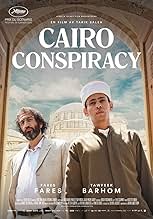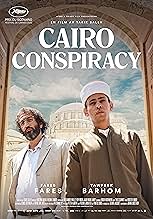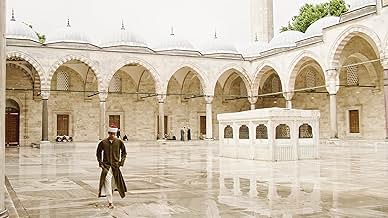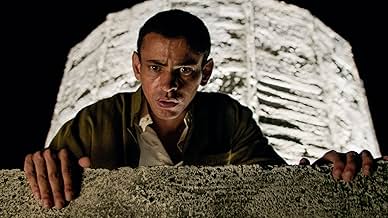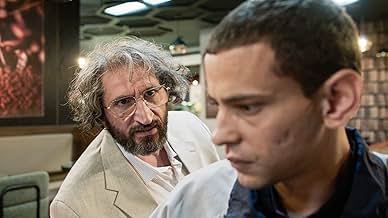CALIFICACIÓN DE IMDb
6.9/10
8.7 k
TU CALIFICACIÓN
Adam, hijo de un pescador, recibe el privilegio de estudiar en la Universidad Al-Azhar de El Cairo, el centro de poder del Islam Suní. Adam se convierte en un peón en el conflicto entre las ... Leer todoAdam, hijo de un pescador, recibe el privilegio de estudiar en la Universidad Al-Azhar de El Cairo, el centro de poder del Islam Suní. Adam se convierte en un peón en el conflicto entre las élites religiosas y políticas de Egipto.Adam, hijo de un pescador, recibe el privilegio de estudiar en la Universidad Al-Azhar de El Cairo, el centro de poder del Islam Suní. Adam se convierte en un peón en el conflicto entre las élites religiosas y políticas de Egipto.
- Dirección
- Guionista
- Elenco
- Premios
- 5 premios ganados y 21 nominaciones en total
Mohammad Bakri
- General Al Sakran
- (as Mohamad Bakri)
Makram Khoury
- Blind Sheikh Negm
- (as Makram J. Khoury)
Ahmed Laissaoui
- Raed
- (as Ahmed Lassaoui)
Hassan El Sayed
- Village Imam
- (as Hassan El-Sayed)
- Dirección
- Guionista
- Todo el elenco y el equipo
- Producción, taquilla y más en IMDbPro
Opiniones destacadas
Boy from Heaven is not an easy watch but it is unusual, inspiring and fascinating in its portrayal of a world unknown to most non-Muslims. It creates an atmosphere both sacred and threatening and the main character, in his tortured vulnerability and innate purity, is a compelling watch. It was by far my favourite movie at the Melbourne International Film Festival.
Every scene is rivetting as the plot becomes more and more dangerous for our young hero: life here is cheap and political influence all important. The film is a visual delight and the cinematography excellent. Above all, it is full of pauses and silence, reflective silence, giving the viewer time to catch their breath in the midst of the brutal reality of life at the spiritual university. This is truly a great movie!
Every scene is rivetting as the plot becomes more and more dangerous for our young hero: life here is cheap and political influence all important. The film is a visual delight and the cinematography excellent. Above all, it is full of pauses and silence, reflective silence, giving the viewer time to catch their breath in the midst of the brutal reality of life at the spiritual university. This is truly a great movie!
Fresh from a viewing of "The Nile Hilton incident", watching "Boy from heaven" consolidates the prowess of Tarek Saleh as a filmmaker: a robust and sensational story coupled with a minimalistic yet ever developing sense of flashy cinematography. This review is probably going to end up being a comparison between Saleh's newest film and his previous, so let's get the latter out of the way: "The Nile-Hilton incident" is a thriller crime film deeply rooted in the depiction of an Egyptian society that is on the brink of an Arab spring revolution. The story follows Fares Fares' character, a deeply corrupt cop who is assigned an investigation into a shady hotel murder that turns his life upside down. There are undoubtedly two things that should be said about this film: firstly, the story is pretty good! It is used as an apparatus to unravel the complexities of an Egyptian society in spiral, laden by crime, poverty and police corruption. However, a second point must be raised: the film lacks the kind of artistic and technical passages that tickle the imposter snob in me. It is very plainly shot and that can be said about hundreds of great films, but fortunately not about "Boy from heaven".
I never thought a red turban could have ever been this beautiful. This movie really superseded my expectations in terms of the cinematography while maintaining a solid loyalty to its great story. The film follows a young and candid young man who is chosen to enrol in the Azhar institute: an Islamic studies school that is regarded as a beacon of Islamic sciences in the middle east if not the world. But it is soon understood that this highly coveted institute hides behind it may dark secrets and political conflicts that rival in ruthlessness those inside the Egyptian quasi dictator regime. And Tawfeek Barhom's character finds himself in the middle of this highly volatile and dangerous battle between religion and state.
In this film, Tarek Saleh worked the religious imagery and the beauty of the spiritual ritual in a way that reminded me of Paolo Sorrentino's "The Young Pope": they both depicted in high detail the serenity of the religious system as well as its terrifying rigour. And Saleh got a few great shots of some red hats! Tarek Saleh has caught the eye of the international cinema community for quite a while, but now has cemented himself as one of the best directors in Egyptian cinema.
I never thought a red turban could have ever been this beautiful. This movie really superseded my expectations in terms of the cinematography while maintaining a solid loyalty to its great story. The film follows a young and candid young man who is chosen to enrol in the Azhar institute: an Islamic studies school that is regarded as a beacon of Islamic sciences in the middle east if not the world. But it is soon understood that this highly coveted institute hides behind it may dark secrets and political conflicts that rival in ruthlessness those inside the Egyptian quasi dictator regime. And Tawfeek Barhom's character finds himself in the middle of this highly volatile and dangerous battle between religion and state.
In this film, Tarek Saleh worked the religious imagery and the beauty of the spiritual ritual in a way that reminded me of Paolo Sorrentino's "The Young Pope": they both depicted in high detail the serenity of the religious system as well as its terrifying rigour. And Saleh got a few great shots of some red hats! Tarek Saleh has caught the eye of the international cinema community for quite a while, but now has cemented himself as one of the best directors in Egyptian cinema.
If there are certain films that we consume and extract everything they want to tell us at the moment it ends, there are others that have much to explore and understand between the lines. Cairo Conspiracy - previously called Boy From Heaven, a much more suitable title - is a political and religious thriller with some very clear messages but also a lot to read and extrapolate.
The story is simple and seemingly contained. It tells us about a boy, Adam (Tawfeek Barhom), who receives a letter that will change his life: he has been accepted at the prestigious Al-Azhar University in Cairo, Egypt. As soon as he arrives, the Grand Imam of al-Azhar dies suddenly, and a power struggle to replace him begins. For someone with little knowledge of the culture in question and what this position actually represents - believe me, this is much more than a mere college dean in the US - it may seem strange why this is such a coveted place. Why do some people kill? Why do some people give their lives? I confess that when the film ended, I researched the topic a bit more, however, the film does a good job of showing us the importance of what we are talking about here, involving various religious fabrics - more or less dangerous - and the government itself. And where does Adam fit in? Well, Adam, who until then was little more than "the fisherman's son," finds himself involuntarily involved in the centre of these intrigues, conspiracies, and dangerous games.
Tawfeek Barhom - whom I did not know before - has a powerful interpretation as Adam. A young man who still needs to get to know himself but has little time to look at himself. He doesn't always do the right thing. He doesn't always know what to do. He doesn't always find it easy to express what he feels. He is a confused teenager, like any teenager, but he cannot afford to remain in that state for too long. He is forced to become a man. Right now.
Man. If there's one thing that this movie doesn't lack, it's men. It's almost impossible to see a woman in this toxic and patriarchal world. When any attention is given to a woman, it's to expose the way she's treated by society and the more powerful. It's to show us that she should remain without opinion, without identity, submissive and obedient to what life - men - enable her to do. I may be using a lot of words on something that isn't the central theme of this film, but I feel that Tarik Saleh's choice is intentional. Even when he shows us certain family environments of characters who should be dear to us, the writer and filmmaker gives us clues about what he thinks about the concept of family and how genders have well-defined roles within society.
Through this, we can also extract much of what this film wants to say about its central themes. We're talking about a society that merges with its religiosity. Everyone's roles converge with Islam, whether we're talking about a more radical or more open side of it. And when they diverge in the customs and teachings passed down by the written and spoken word, it invariably serves to expose all the hypocrisy of a system that only survives because it enables a few to dominate and control everything and everyone. When Saleh shows us daily hygienic rituals specific to religion, he shows us people cleaning themselves of all their sins, all their anxieties, and all their filth. The filth that leaves marks on the outside and the filth that leaves marks on the inside. And, no matter how much goodwill and people want to do better, there are always stronger forces that could take them down undesired paths, paths that don't represent what that - or any other - religion stands for on paper.
When it comes to power dynamics, Cairo Conspiracy is fascinating. It is so when it demonstrates the calculated relationships of those who know a lot about this life. It is even more fascinating when, gradually, it reveals who are, in fact, the main players of this game and who are their pawns. There are pawns for all tastes. This is particularly visible in the figure of the investigator we follow more closely - Ibrahim, very well portrayed, full of nuances by the already well-known Fares Fares - who has his own pawns and is also a pawn of someone else.
There are also other major pawns. Those who should not even be there. I'm talking about the students of that University who, on one side or the other of the board, have been used in power and backstage wars, being manipulated for personal purposes. This is also a way of keeping society the way it is, indoctrinating - grooming is the right word - from an early age, reaching those most susceptible and feeding the system itself.
Cairo Conspiracy may seem, at times, a cold film. It is a film with no completely right sides or characters doing what we are used to see in Hollywood heroes. But do not be fooled. When it criticizes the functioning of a society, it is not pushing us away from its people. It acknowledges the cynicism but also believes in individuals and the impact that small choices can have. It is not asking for war. It is shouting for help. It is shouting for change. The change of men.
The story is simple and seemingly contained. It tells us about a boy, Adam (Tawfeek Barhom), who receives a letter that will change his life: he has been accepted at the prestigious Al-Azhar University in Cairo, Egypt. As soon as he arrives, the Grand Imam of al-Azhar dies suddenly, and a power struggle to replace him begins. For someone with little knowledge of the culture in question and what this position actually represents - believe me, this is much more than a mere college dean in the US - it may seem strange why this is such a coveted place. Why do some people kill? Why do some people give their lives? I confess that when the film ended, I researched the topic a bit more, however, the film does a good job of showing us the importance of what we are talking about here, involving various religious fabrics - more or less dangerous - and the government itself. And where does Adam fit in? Well, Adam, who until then was little more than "the fisherman's son," finds himself involuntarily involved in the centre of these intrigues, conspiracies, and dangerous games.
Tawfeek Barhom - whom I did not know before - has a powerful interpretation as Adam. A young man who still needs to get to know himself but has little time to look at himself. He doesn't always do the right thing. He doesn't always know what to do. He doesn't always find it easy to express what he feels. He is a confused teenager, like any teenager, but he cannot afford to remain in that state for too long. He is forced to become a man. Right now.
Man. If there's one thing that this movie doesn't lack, it's men. It's almost impossible to see a woman in this toxic and patriarchal world. When any attention is given to a woman, it's to expose the way she's treated by society and the more powerful. It's to show us that she should remain without opinion, without identity, submissive and obedient to what life - men - enable her to do. I may be using a lot of words on something that isn't the central theme of this film, but I feel that Tarik Saleh's choice is intentional. Even when he shows us certain family environments of characters who should be dear to us, the writer and filmmaker gives us clues about what he thinks about the concept of family and how genders have well-defined roles within society.
Through this, we can also extract much of what this film wants to say about its central themes. We're talking about a society that merges with its religiosity. Everyone's roles converge with Islam, whether we're talking about a more radical or more open side of it. And when they diverge in the customs and teachings passed down by the written and spoken word, it invariably serves to expose all the hypocrisy of a system that only survives because it enables a few to dominate and control everything and everyone. When Saleh shows us daily hygienic rituals specific to religion, he shows us people cleaning themselves of all their sins, all their anxieties, and all their filth. The filth that leaves marks on the outside and the filth that leaves marks on the inside. And, no matter how much goodwill and people want to do better, there are always stronger forces that could take them down undesired paths, paths that don't represent what that - or any other - religion stands for on paper.
When it comes to power dynamics, Cairo Conspiracy is fascinating. It is so when it demonstrates the calculated relationships of those who know a lot about this life. It is even more fascinating when, gradually, it reveals who are, in fact, the main players of this game and who are their pawns. There are pawns for all tastes. This is particularly visible in the figure of the investigator we follow more closely - Ibrahim, very well portrayed, full of nuances by the already well-known Fares Fares - who has his own pawns and is also a pawn of someone else.
There are also other major pawns. Those who should not even be there. I'm talking about the students of that University who, on one side or the other of the board, have been used in power and backstage wars, being manipulated for personal purposes. This is also a way of keeping society the way it is, indoctrinating - grooming is the right word - from an early age, reaching those most susceptible and feeding the system itself.
Cairo Conspiracy may seem, at times, a cold film. It is a film with no completely right sides or characters doing what we are used to see in Hollywood heroes. But do not be fooled. When it criticizes the functioning of a society, it is not pushing us away from its people. It acknowledges the cynicism but also believes in individuals and the impact that small choices can have. It is not asking for war. It is shouting for help. It is shouting for change. The change of men.
Boy From Heaven is a watchable, exciting film where the action is set in Egypt and at the religious Al-Azhar University. The main character Adam, brilliantly played by Tawfeek Barhom gets a place at this university. He gives up his life as a fisherman and starts his studies. The film then takes a very surprising turn, becoming a suspense film, a thriller in an environment that is rarely depicted on film. Swedish Fares Fares has the other lead role, and together with Barhom they give life to the main characters in the film.
At a time when mainstream film is almost everything that gets a mention and that "everyone" must see, it is liberating to see such a film of this quality.
I would like to see more of Fares Fares and Tawfeek Barhom, and director Tarik Saleh has already shown that he can make quality films, both dramas and now thrillers.
Give this and other films that aren't necessarily on everyone's lips a chance. They give us diversity and very good entertainment.
At a time when mainstream film is almost everything that gets a mention and that "everyone" must see, it is liberating to see such a film of this quality.
I would like to see more of Fares Fares and Tawfeek Barhom, and director Tarik Saleh has already shown that he can make quality films, both dramas and now thrillers.
Give this and other films that aren't necessarily on everyone's lips a chance. They give us diversity and very good entertainment.
I like it when films shake the foundations of real life supremacy, this film is one of them. The subject matter is a hot topic and a very controversial one, which is why Tarik Saleh, the filmmaker, is persona non grata in Egypt, and the film was shot in Turkey although it is meant to portray the Azhar Mosque.
This is the story of Adam, the son of a fisherman who gets a letter of approval from the Azhar mosque to join their ranks, coincidentally the Imam. Trouble is brewing in the heels of appointing the next Imam!
This is a well made film with a well-made screenplay and memorable performances from the lead actor.
This is the story of Adam, the son of a fisherman who gets a letter of approval from the Azhar mosque to join their ranks, coincidentally the Imam. Trouble is brewing in the heels of appointing the next Imam!
This is a well made film with a well-made screenplay and memorable performances from the lead actor.
¿Sabías que…?
- TriviaA few days before the shooting in Egypt for Crimen en el Cairo (2017) was supposed to take place, director Tarik Saleh was publicly removed from the country and told not to come back. As a result, that movie was shot in Casablanca, Morocco. As he's still persona non grata in Egypt, he couldn't shoot Conspiración Divina (2022) there, thus despite being set in Cairo, the film was actually shot in Istanbul, Turkey, mostly in the Süleymanye mosque.
- ConexionesFeatured in Il était une fois...: La conspiration du Caire (2024)
Selecciones populares
Inicia sesión para calificar y agrega a la lista de videos para obtener recomendaciones personalizadas
- How long is Cairo Conspiracy?Con tecnología de Alexa
Detalles
- Fecha de lanzamiento
- Países de origen
- Sitios oficiales
- Idioma
- También se conoce como
- Cairo Conspiracy
- Locaciones de filmación
- Productoras
- Ver más créditos de la compañía en IMDbPro
Taquilla
- Presupuesto
- EUR 6,500,000 (estimado)
- Total a nivel mundial
- USD 4,867,691
- Tiempo de ejecución2 horas 6 minutos
- Color
- Mezcla de sonido
- Relación de aspecto
- 2.39 : 1
Contribuir a esta página
Sugiere una edición o agrega el contenido que falta


